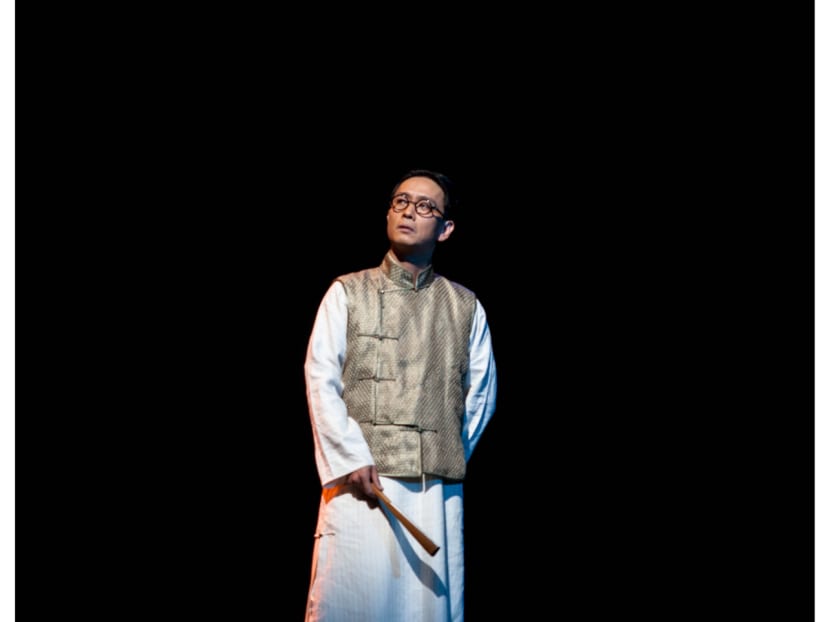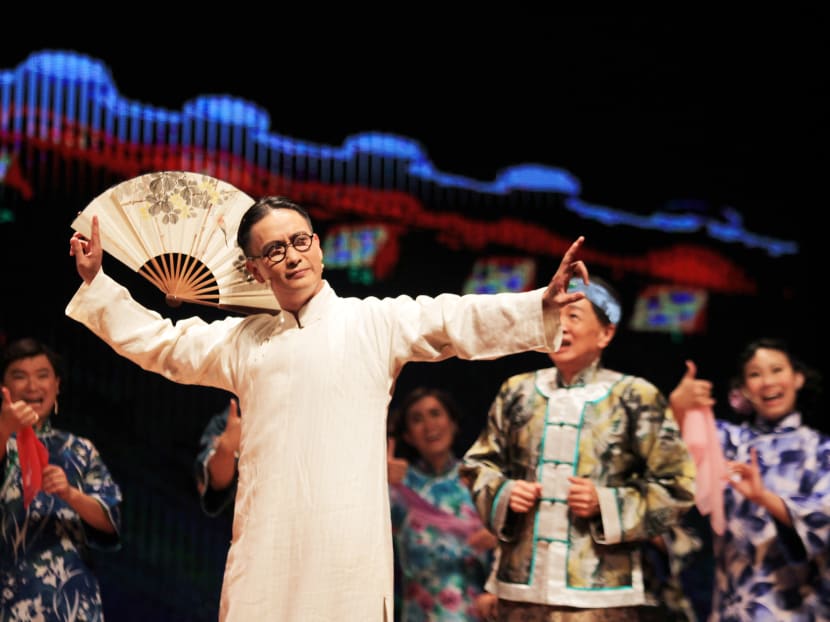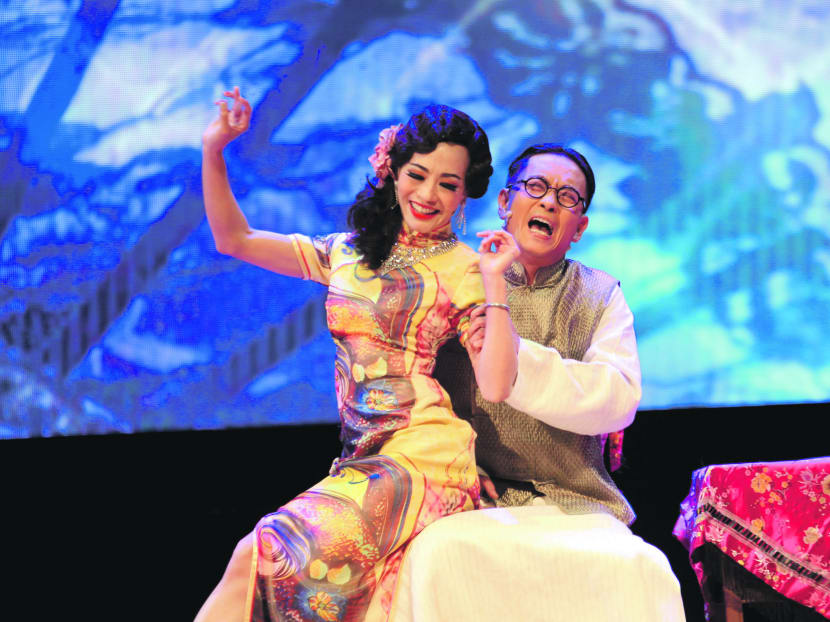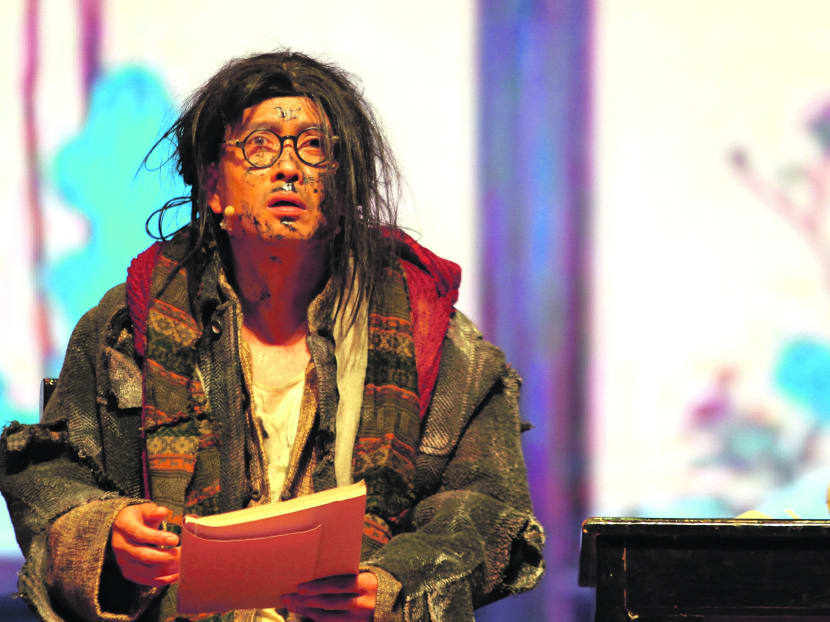The men of The Mad Phoenix
Contrary to what you may think, The Mad Phoenix is not a play about a mythical bird with a neurological affliction. But it’s not quite your typical play, either.




Contrary to what you may think, The Mad Phoenix is not a play about a mythical bird with a neurological affliction. But it’s not quite your typical play, either.
Written by renowned Hong Kong playwright Raymond To, The Mad Phoenix tells the story of an eccentric Cantonese opera playwright Kong Yu Kau, whose genius and temperamental personality won him both admirers and enemies from the height of his career in the early 20th century, up to his death in the 1970s.
It has become one of Hong Kong’s most famous plays and been staged more than 100 times since it premiered in 1993 — including a sold-out run of 24 performances last year. A Mandarin version of the show, translated by Koh Teng Liang, was also staged here by Singapore theatre company Toy Factory in 2003.
Next week, MediaCorp VizPro International and Spring-Time Productions will be staging the play at the Kallang Theatre; and for the first time, audiences in Singapore will be able to catch The Mad Phoenix in Cantonese, the original language of the play.
For actor Tse Kwan-Ho, who won the Best Actor award at the 1997 Golden Horse Awards for his performance in the film version of the play, portraying Kong Yu Kau has been the role of a lifetime.
“Members of the audience who have been watching the play since we began staging it 20 years ago have witnessed how I’ve grown. I have also seen them mature. It’s quite an extraordinary experience,” he said over the phone. “Their looks have changed. Those who were students in the past have now come back as managers. And the young women who used to be single now come with two or three children!”
But according to the play’s producer Clifton Ko Chi Sum, best known for directing popular Hong Kong movies such as Happy Ghost and All’s Well, Ends Well back in the 1990s, the version audiences here will be watching is very similar to the one originally staged in 1993.
“The play has to remain exactly the same as it was. It’s very representative of Hong Kong, because it’s about Hong Kong’s history and Cantonese opera — an important part of the city’s past,” said Ko, who also directed the award-winning 1997 film version.
“The character Kong, as it is written by Raymond To, is very dramatic. The play is about a man whose talents have not been recognised, and many members of the audience can really identify with that. So why would we want to change a show like that? We want to bring the original show to Singapore — without changing a single thing,” Ko explained.
Q: Were you concerned when you re-staged the play last year that younger audiences might not be familiar with the main character or be able to appreciate the play?
Tse: Yes, I was a little concerned. But when the show began, I realised many people in the audience were very young. I asked some of them if they understood the play. They said they didn’t, but they thought the music sounded nice. They liked the story and the character — his talents and his principles. And I think these characteristics are universal.
Q: Clifton, how do you think Tse Kwan-Ho has evolved as an actor on the same show in the last 20 years?
Ko: If you are asking whether he is 100 per cent the same as the actor he was 20 years ago, as producer and director of the film version of the play, I can tell you he is not. But only someone who is as familiar with the show as I am can tell the difference. He has changed his rhythm in some parts of the show and he has changed his reaction, just ever so slightly, in others. But most people wouldn’t be able to tell. I am way too familiar with this play. I think this change is emblematic of his maturity. He was in his 30s when he first starred in this play. Now he is ... I won’t tell you how old he is!
Q: Tse, you’ve played this character more than 100 times. Are you still challenged by the role?
Tse: To be honest, I am not. And I don’t like to use the word “challenge”. I prefer “enjoyment”. I really cherish every moment on stage and am very grateful to the audience for buying tickets to see our play.
Q: Are you both fans of Cantonese opera?
Tse: I listen to Cantonese opera and sing along, but not professionally. When I was a child, my mother used to play Cantonese opera on the cassette tapes, and I would listen too. When I took this role 20 years ago, I didn’t understand Cantonese opera at all. But we had teachers to teach us, so I memorised each line painstakingly.
Ko: In the 1990s, I produced a movie called Stage Door, starring Josephine Siao. I started learning more about Cantonese opera because of the movie. Now I know a little more, but I can only say I am still in the process of learning. With Cantonese opera, the more time you spend learning about it, the more addicted you are to it. You’ll slowly realise you can’t let it go. It’s good type of addiction. It’s a big part of Chinese culture.
Q: This play is about an eccentric playwright whose talents have not been recognised. Do you know anyone like that in the entertainment business?
Ko: Oh, there have been too many of them! Well, every one goes through ups and downs in life. For some, all their good luck comes when they are very young. Like with Kong Yu Kau — all his success took place before he turned 30. After that, everything went downhill. But with some other people, they start out working very hard and find success only later in life.
Q: What about your own experiences?
Ko: My highs and lows are pegged to the box office! Happy Ghost and All’s Well, Ends Well were the highlights of my career. But when my movies didn’t sell, I had to endure sarcasm and criticism and people who tried to reduce my commission. This is why this show will resonate with everyone. On the surface, it’s about a playwright. But when you watch this play, you’ll see that it really is about life.
What: The Mad Phoenix
Where: Kallang Theatre
When: Feb 28 and March 1, 8pm (2.30pm matinee on March 1)
Tickets: From S$48 to S$108 from SISTIC





